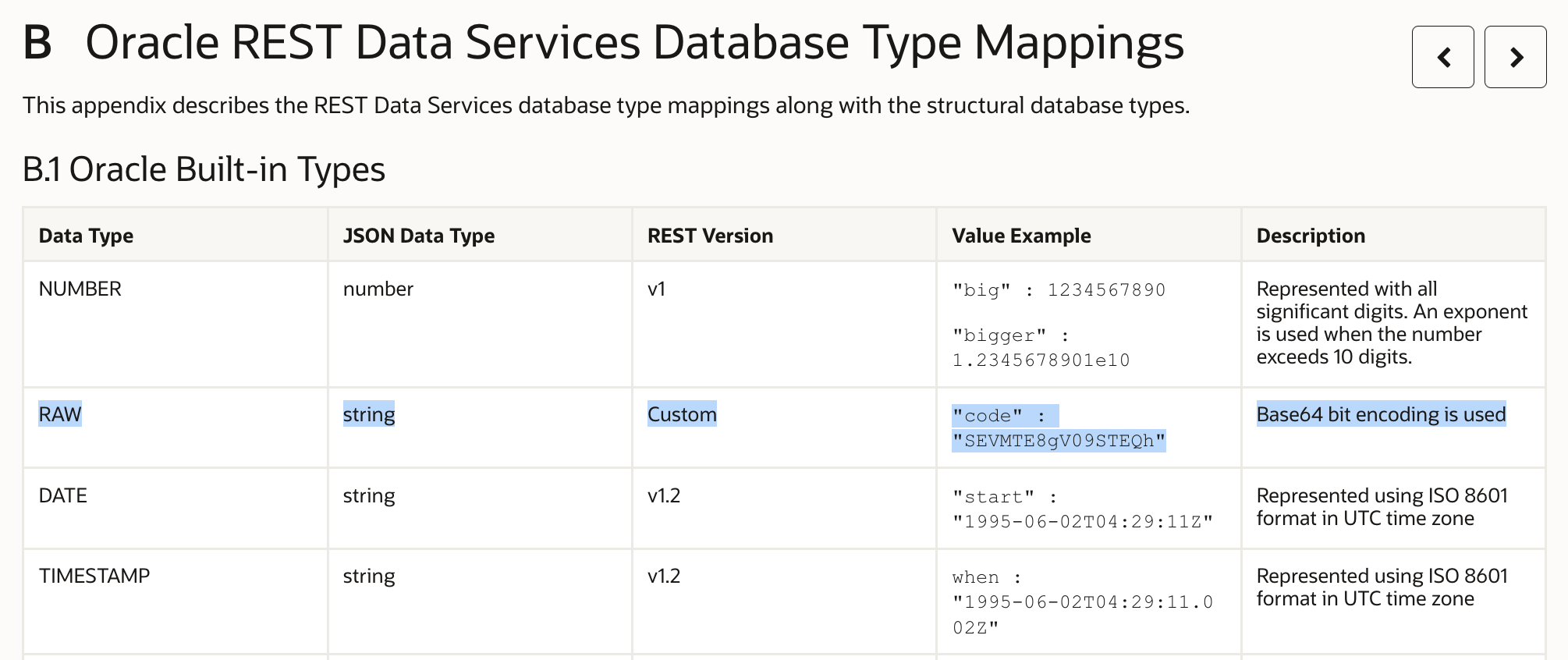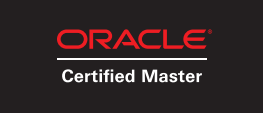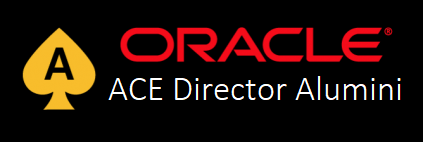Those days, I was building a REST API service for retrieving the columns of a checksum table.
The table structure was pretty simple:
CREATE TABLE "DEMO" ( "PATH" VARCHAR2(500 CHAR), "MD5_HASH" RAW(16) ); INSERT INTO DEMO ( PATH, MD5_HASH ) VALUES ( 'bundle.xml', '70D53BE37073B31347EE42B622EA4A75' ); COMMIT;
So, as you can see, very simple table with a path to a file and its checksum.
Now, create a simple ORDS service to just show the table contents:
BEGIN
ORDS.DEFINE_MODULE(
p_module_name => 'test',
p_base_path => '/test/',
p_items_per_page => 25,
p_status => 'PUBLISHED',
p_comments => NULL);
ORDS.DEFINE_TEMPLATE(
p_module_name => 'test',
p_pattern => 'test',
p_priority => 0,
p_etag_type => 'HASH',
p_etag_query => NULL,
p_comments => NULL);
ORDS.DEFINE_HANDLER(
p_module_name => 'test',
p_pattern => 'test',
p_method => 'GET',
p_source_type => 'json/collection',
p_items_per_page => 25,
p_mimes_allowed => NULL,
p_comments => NULL,
p_source => 'SELECT * FROM DEMO');
COMMIT;
END;
/
And now, getting the data from the endpoint:
$ curl -s -S -k --request GET https://xxx.yyy.zzz.adb.us-phoenix-1.oraclevcn.com/ords/test/test/test | jq
{
"items": [
{
"path": "bundle.xml",
"md5_hash": "cNU743BzsxNH7kK2IupKdQ=="
}
],
"hasMore": false,
"limit": 25,
"offset": 0,
"count": 1,
"links": [
{
"rel": "self",
"href": "https://xxx.yyy.zzz.adb.us-phoenix-1.oraclevcn.com/ords/test/test/test"
},
{
"rel": "describedby",
"href": "https://xxx.yyy.zzz.adb.us-phoenix-1.oraclevcn.com/ords/test/metadata-catalog/test/item"
},
{
"rel": "first",
"href": "https://xxx.yyy.zzz.adb.us-phoenix-1.oraclevcn.com/ords/test/test/test"
}
]
}
So, as you can see, the column md5_hash was converted from 70D53BE37073B31347EE42B622EA4A75 to cNU743BzsxNH7kK2IupKdQ==.
Why? In the official doc, you can see:

So this is expected. The reason RAWs are converted is mainly that the base64 needs 1.33 characters per byte. Hex encoding requires 2 characters per byte. Base64 is the common encoding of binary values transported as text in various protocols.
How do we convert back? If using shell, you could simply:
$ echo "cNU743BzsxNH7kK2IupKdQ==" | base64 -d | hexdump -v -e '/1 "%02X"' 70D53BE37073B31347EE42B622EA4A75
Now, what if instead, you want to make ORDS not convert RAW to BASE64?
The only way to do that is if in the SQL layer you return a VARCHAR2 instead of a RAW, and this can be easily achievable through the RAWTOHEX function.
BEGIN
ORDS.DEFINE_HANDLER(
p_module_name => 'test',
p_pattern => 'test',
p_method => 'GET',
p_source_type => 'json/collection',
p_items_per_page => 25,
p_mimes_allowed => NULL,
p_comments => NULL,
p_source => 'SELECT PATH, RAWTOHEX(MD5_HASH) MD5_HASH FROM DEMO');
COMMIT;
END;
/
And finally, getting the data from the endpoint:
$ curl -s -S -k --request GET https://xxx.yyy.zzz.adb.us-phoenix-1.oraclevcn.com/ords/test/test/test | jq
{
"items": [
{
"path": "bundle.xml",
"md5_hash": "70D53BE37073B31347EE42B622EA4A75"
}
],
"hasMore": false,
"limit": 25,
"offset": 0,
"count": 1,
"links": [
{
"rel": "self",
"href": "https://xxx.yyy.zzz.adb.us-phoenix-1.oraclevcn.com/ords/test/test/test"
},
{
"rel": "describedby",
"href": "https://xxx.yyy.zzz.adb.us-phoenix-1.oraclevcn.com/ords/test/metadata-catalog/test/item"
},
{
"rel": "first",
"href": "https://xxx.yyy.zzz.adb.us-phoenix-1.oraclevcn.com/ords/test/test/test"
}
]
}
Have you enjoyed? Please leave a comment or give a 👍!







